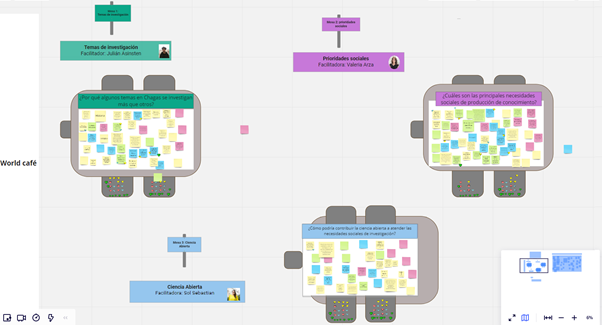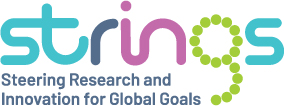Valeria Arza, Julián Asinsten y Sol Sebastián
Results from World Café exercise | Online Workshop from STRINGS project
On October 29th, we held a virtual workshop to outline, in a collaborative way, what type of scientific research is most helpful in addressing Chagas disease, which is one of the case studies carried out in the context of the STRINGS project. Fifteen people participated from different parts of the country. They contributed their experience and perspective on the topic. Among participants, there were actors from scientific, public policy and civil society organisations.
The workshop was organized with a “World Café” methodology: three discussion tables were proposed, around which all participants rotated over two and a half hours. The discussions were very rich; they were carried out in small groups and we noticed interest in participating and a fair word circulation. We synthetise the main points that emerged in each table below.

Table 1: Why are some topics more highly prioritised in the scientific agenda about Chagas?
Participants contributed with different views. They pointed to funding schemes as one of the main reasons for the prevalence of certain research topics over others. This generates a bias: as there is more research on certain topics, there are also more academic outputs (publications/patents) and experience, which further reinforced the existing research trajectories. In addition, funding schemes often depend heavily on political-regional strategies affected by different interests. Some participants argued that the research system is tied to an economic system that privileges research in areas in which greater future economic returns can be obtained.
In turn, scientific institutions developed a trajectory on certain topics and it is then difficult to change the course. There are sunk costs associated with starting new research lines. The importance of the incentive system to guide research was also mentioned. In particular, it was pointed out that interdisciplinary research is not promoted since its potential for social impact has only recently been acknowledged
There were some claims for scientific policy to be more explicit about directions to be promoted. In particular, many agreed that there is a need to better articulate the scientific research on Chagas within the public policies arena and the health system.
Several participants highlighted that science and technology policies do not take into consideration the multidimensionality of Chagas: for example, the programme “Argentina Innovadora 2020” only funds the development of diagnosis kits and vaccines. Some participants claimed that they were concerned that the idea that Chagas should be addressed “more at the laboratory than in the territory” is extending. They argued that this conviction only contributed to further consolidating the biomedical hegemony.
In addition, we found that there are still concepts under dispute: while some argued that Chagas is a disease that should be tackled both from the medical and social perspectives, others pointed out that it should not be thought of as a disease but rather as a complex and multidimensional problem.
Table 2: What are the social needs for scientific production in relation to Chagas?
Carlos Chagas´ studies identified the parasite, the vector and a series of clinical manifestations of the disease more than one hundred years ago. Yet, today Chagas continues to be a very important problem, with multiple dimensions to address. What knowledge is lacking to better address this complexity? For various participants, the question about “knowledge” referred to contributions from biology or medicine, where most of the scientific production on Chagas is concentrated. For many, “knowledge” is not lacking, but instead, there is a need for knowing better how to apply scientific knowledge.
Enhancing the articulation between the scientific systems and those who make decisions was seen as a strategy to address such shortcomings. The need to link the State with the companies to develop new technologies was also noted. Problems of communication and education were highlighted as well: “We need a health system that sees Chagas as an existing problem”.
Several participants commented on the need to improve the approach on public policy to be more comprehensive, taking into account biomedical, epidemiological, economic, political and cultural issues. Among other aspects, some participants mentioned the need to empower affected communities to defend their rights, arguing that in relation to other problems with lower incidence of affected people, such as HIV, the scientific and political solutions that emerged were triggered by pressures from an organized community.
Table 3: How can Open Science help to produce knowledge better aligned with needs?
The definition of “Open Science” was presented at the beginning of the session as research done in collaboration with diverse academic and non-academic actors including potential users. Open science practices promote sharing openly both research outputs and processes. In addition, they include extensive engagement, outreach and communication activities to enhance science-society connections. “Open Science” was presented as opposed to “Conventional Science”, defined as professional scientific research based on expert knowledge carried out in academic spaces or laboratories. The main aim is to design technical solutions that can be transferred to society using different policy schemes such as public-private research partnerships, or technological licenses or contracts of technical assistance.
The participants agreed that the definition of Open Science is very broad and that, depending on how it is interpreted the contribution may vary. Thus, there were discussions about different strategies related to, on the one hand, sharing scientific resources openly and on the other, enhancing collaboration, especially with social actors who may participate in knowledge production processes. Open access databases were seen as valuable for drug discovery and development. Similarly, the possibility of sharing data from clinical records was seen as important to move ahead in developing better diagnosis methods and treatments. Most participants agree that sharing knowledge saves time and resources. It was suggested that science policy should promote these types of strategies, especially for research funded by public sources.
There was a fairly wide agreement around the idea that interaction among different actors is enriching. In addition, inter- and transdisciplinary research, which also includes the affected population, was seen as superior to address complexity. It was claimed that in this way science could be better situated, and therefore, it may be in a better position to respond to societal needs. Participants also mentioned the need to translate research results for a wider and diverse audience. However, many participants proposed that these activities should be carried out by people trained in communication skills, who should be involved in research teams. This was seen as important not just to avoid putting too much pressure on researchers’ time but especially because they may not be the most capable to pursue those tasks effectively. In addition, the use of social networks was seen by some participants as an effective channel to interact and exchange with other actors. “These networks create a back and forth channel with the people, and when the laboratory opens the projects are enriched”. Finally, open science was also seen as enabling the possibility of involving social actors in the design of a research project, which may further contribute to translating scientific language into plain language.

Leave A Comment